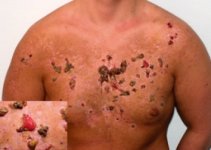Case study: anabolic steroids zits made worse by isotretinoin
Anabolic steroids users that get extreme acne sometimes treat it with vitamin A-based isotretinoin. Roche sells it under the name of Roaccutane. It works in most cases – but sometimes it makes the problem worse. Dermatologists at University Hospital Erlangen describe a case in the International Wound Journal.
*
*
*
The protagonist in the German study is a 22 year-old bodybuilder who had been using steroids for a year. He'd been using, among other things, the testosterone-based Sustanon. Five weeks into a course he developed masses of pustules on his chest, and subcutaneous inflammation as well. The bodybuilder, who knew he was susceptible to acne, stopped injecting but the problem didn't go away. He went to the doctor, who prescribed doxycycline. The bodybuilder took this antibiotic for 4 weeks, but it didn't help.
So the doctor then gave him isotretinoin [structural formula shown above], 50 mg a day. Isotretinoin is a strong drug. It has side effects, but usually provides immediate relief – but not in the case of the bodybuilder. His acne, the doctor confirmed after 5 weeks, continued to get worse.
The bodybuilder developed scars and inflammations on his chest and shoulders, which were painful to the touch and bled easily. He developed patches of pink skin growths, that looked like pyogenic granuloma. They contained the notorious skin bacteria*Staphylococcus aureus.
A piece of this pink tissue is shown in the inset below left.
The doctors continued with the isotretoin for a couple of months in the hope that it would help. After 7 weeks nothing had changed, so they decided to adopt more drastic measures. The bodybuilder was given 2 g of the antibiotic cefotiam three times a day intravenously, and his spots were treated with a cream containing betamethasone. This treatment helped, and after two weeks his skin had cleared up.
Researchers estimate that about one in two steroids users has an acne problem. After aggression and irritability, it's the most common side effect of steroids.[Eur J Clin Pharmacol. 2003 Nov;59(8-9):571-7.]
A non-medical way of reducing acne is to limit the amount of 'fast' carbohydrates like sugar and white bread in your diet.*[Am J Clin Nutr. 2007 Jul;86(1):107-15.]
Source:*
Int Wound J 2010; 7:199–201.

Anabolic steroids users that get extreme acne sometimes treat it with vitamin A-based isotretinoin. Roche sells it under the name of Roaccutane. It works in most cases – but sometimes it makes the problem worse. Dermatologists at University Hospital Erlangen describe a case in the International Wound Journal.
*
*
*
The protagonist in the German study is a 22 year-old bodybuilder who had been using steroids for a year. He'd been using, among other things, the testosterone-based Sustanon. Five weeks into a course he developed masses of pustules on his chest, and subcutaneous inflammation as well. The bodybuilder, who knew he was susceptible to acne, stopped injecting but the problem didn't go away. He went to the doctor, who prescribed doxycycline. The bodybuilder took this antibiotic for 4 weeks, but it didn't help.
So the doctor then gave him isotretinoin [structural formula shown above], 50 mg a day. Isotretinoin is a strong drug. It has side effects, but usually provides immediate relief – but not in the case of the bodybuilder. His acne, the doctor confirmed after 5 weeks, continued to get worse.
The bodybuilder developed scars and inflammations on his chest and shoulders, which were painful to the touch and bled easily. He developed patches of pink skin growths, that looked like pyogenic granuloma. They contained the notorious skin bacteria*Staphylococcus aureus.
A piece of this pink tissue is shown in the inset below left.
The doctors continued with the isotretoin for a couple of months in the hope that it would help. After 7 weeks nothing had changed, so they decided to adopt more drastic measures. The bodybuilder was given 2 g of the antibiotic cefotiam three times a day intravenously, and his spots were treated with a cream containing betamethasone. This treatment helped, and after two weeks his skin had cleared up.
Researchers estimate that about one in two steroids users has an acne problem. After aggression and irritability, it's the most common side effect of steroids.[Eur J Clin Pharmacol. 2003 Nov;59(8-9):571-7.]
A non-medical way of reducing acne is to limit the amount of 'fast' carbohydrates like sugar and white bread in your diet.*[Am J Clin Nutr. 2007 Jul;86(1):107-15.]
Source:*
Int Wound J 2010; 7:199–201.


